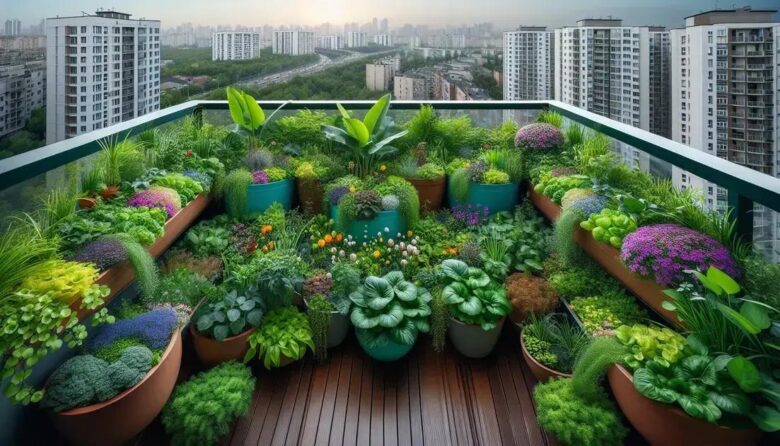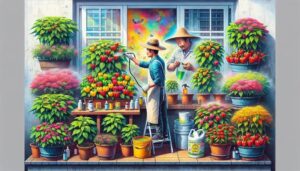Natural fertilizers like compost and worm castings are ideal for container gardening, boosting plant growth, enriching soil health, and ensuring sustainability without chemical runoff, making them the superior choice for thriving, eco-friendly gardens.
Trust in the potential of natural fertilizers can transform your container gardening experience. Ever wondered how nature’s own nutrients can make your plants thrive? Delving into these organic options not only promotes robust growth but also enhances your confidence as a gardener. Let’s explore how these natural fertilizers can be your secret weapon for lush, healthy plants.
why choose natural fertilizers for containers
Choosing natural fertilizers for container gardening offers numerous advantages, especially for those seeking sustainable and eco-friendly methods. These fertilizers, derived from organic sources, improve soil health by enriching it with essential nutrients without the chemical residues often found in synthetic options. One of the key benefits is their ability to enhance the soil’s structure, promoting better water retention and aeration. This is particularly important for container plants, which rely heavily on the limited soil volume for nutrients and water. Moreover, natural fertilizers like compost, worm castings, and bone meal provide a balanced nutrient profile, ensuring steady and long-term plant growth.
Eco-Friendly and Sustainable
Using natural fertilizers supports biodiversity and reduces the carbon footprint of your gardening. By choosing organic matter, gardeners contribute to healthier ecosystems and promote sustainable practices. Additionally, these materials are often locally sourced or homemade, which minimizes environmental impact compared to transported chemical fertilizers. Embracing natural fertilizers not only nurtures your plants but also takes a step towards ecological responsibility.
types of natural fertilizers: which is best
When selecting the best natural fertilizers for your container garden, it’s important to understand the unique properties of each option. Compost is one of the most common choices, rich in nutrients and beneficial microorganisms, enhancing soil health and plant growth naturally. Knowing that compost is versatile and easy to make at home makes it particularly appealing.
Exploring Organic Choices
Another excellent option is worm castings, which are extremely rich in essential nutrients like nitrogen. They are perfect for boosting plant vitality and improving soil structure. Furthermore, bone meal is high in phosphorus and is vital for strong root development and flowering. Its slow-release nature ensures that plants receive a steady supply of nutrients over time. Bat guano is yet another alternative, rich in nitrogen and phosphorous, making it ideal for leafy growth and flowering. It also has antifungal properties that can protect plants.
Each type of natural fertilizer has its unique benefits, so understanding the specific needs of your plants and garden conditions will guide you in making the best choice. Blending these fertilizers can also provide balanced nutrition for your container plants.
how to apply fertilizers safely in containers
Applying fertilizers safely in container gardens is crucial for plant health and thriving growth. Start by reading the fertilizer package instructions carefully to avoid over-fertilizing, which can harm plants. Measure the correct amount, ensuring you follow guidelines specific for container use. It’s important to water your plants before applying fertilizers to help prevent root burn. This also helps in even distribution of nutrients throughout the soil.
In liquid form, ensure an even spread by mixing the fertilizer with water according to the recommended ratios. Slowly pour it around the base of the plant, avoiding direct contact with leaves to prevent damage. For granular fertilizers, lightly scratch the soil surface with a hand fork and sprinkle the granules evenly. After application, water the container again to help incorporate the nutrients into the soil.
Adjust the frequency of fertilizer application based on the plant’s growth stage. Younger plants may need less frequent applications compared to mature, fruit-bearing ones. Monitoring your plants regularly for signs of nutrient deficiency or excess can help keep them healthy and vigorous.
common mistakes when fertilizing container plants
Fertilizing container plants is essential, but common mistakes can hinder your plants’ growth. Over-fertilization is a frequent error that leads to salt buildup and damage to plant roots. To avoid this, use the recommended doses and frequency, especially for sensitive plants. Under-fertilization can equally be problematic, resulting in sluggish growth and pale leaves. Monitoring your plant’s appearance can help you catch deficiencies early. Choosing the wrong fertilizer type can also be detrimental. Ensure the fertilizer matches the specific needs of your plant type, whether it be for flowers or leafy greens. Not mixing fertilizers properly can cause uneven nutrient distribution in the soil, leaving some areas overloaded and others deficient.
Applying fertilizer directly to dry soil can result in root burn. Water your containers before fertilizing to ensure an even nutrient absorption. Forgetting to account for natural soil depletion over time can lead to poor plant health. Regularly replenish your container soil or add organic matter to maintain its fertility. Being mindful of these mistakes can ensure your container garden thrives.
success stories of container gardening with natural fertilizers
Container gardening with natural fertilizers has led to remarkable success stories, showcasing the power of organic solutions. One gardener transformed her urban balcony, using only homemade compost and worm castings. Her peppers and tomatoes thrived, producing a bountiful harvest that far surpassed her expectations. This success was not only in yield but also in the flavor, with friends and family praising the rich taste and vibrant colors of her produce.
Another enthusiast experimented with bone meal and bat guano for her container roses. These organic fertilizers resulted in roses that bloomed longer and more brightly than ever before, demonstrating the benefits of these natural solutions. Additionally, a community garden collectively decided to switch to organic fertilizers to minimize their environmental impact. Their transition resulted in healthier plants and more robust soil, encouraging more birds and beneficial insects to their gardens. These narratives underline how natural fertilizers can lead to healthier growth and a more sustainable gardening experience.
tips for maintaining soil health in container gardens
Maintaining soil health in container gardens is crucial for robust plant growth. Start by choosing a high-quality potting mix that retains moisture while providing good drainage. Enrich the soil regularly with organic matter like compost or aged manure, which supplies nutrients and promotes beneficial microbial activity.
Consider Soil Aeration
Ensuring proper aeration is also key. Use tools like a hand fork to gently loosen the soil, allowing air to reach the roots. This step prevents compaction—a common issue in containers—that can hinder water flow and root expansion.
Employing cover crops or mulch can help maintain soil moisture and temperature, while also adding organic matter as they decompose. It’s important to monitor pH levels regularly and adjust them if necessary using lime or sulfur, ensuring they align with the needs of your specific plants. Rotate crops within your containers to reduce pest and disease build-up and to keep the soil balanced.
Plan to replace the potting mix every couple of years to refresh the nutrient content and structure, as soil fatigue can set in over time. These simple yet effective practices will keep your container garden soil healthy and productive.
The Benefits of Natural Fertilizers in Container Gardening
Embracing natural fertilizers in container gardening offers a sustainable and effective way to nurture your plants. By using organic options like compost, worm castings, and bone meal, gardeners can enhance soil health and plant growth naturally. These fertilizers not only promote vibrant plant life but also support environmental wellness by reducing the reliance on synthetic chemicals.
Success stories from gardeners who have made the switch demonstrate the tangible benefits, from richer flavors in fruits to healthier blooms. Maintaining soil health through proper practices like crop rotation and organic matter enrichment is key to sustained growth. Avoiding common fertilization mistakes ensures that your plants thrive.
With these insights, gardeners can confidently cultivate lush, productive container gardens. The journey towards a green thumb is supported by nature itself, making natural fertilizers a cornerstone of flourishing gardens.
FAQ – Common Questions About Natural Fertilizers in Container Gardening
What are the advantages of using natural fertilizers?
Natural fertilizers improve soil quality, boost plant growth, and are eco-friendly, reducing chemical runoff and enhancing sustainability.
How often should I apply natural fertilizers to container plants?
Application frequency varies, but generally every 4-6 weeks during the growing season is recommended for optimal plant health.
Can I make my own natural fertilizer?
Yes, you can create compost at home using kitchen scraps and yard waste, providing a rich nutrient mix for your plants.
What common mistakes should I avoid when using natural fertilizers?
Avoid over-fertilizing, choosing the wrong type for your plants, and failing to water soil before application to prevent root burn.
How do I ensure even distribution of fertilizers in containers?
Mix granular fertilizers into the top inch of soil and water thoroughly; for liquid fertilizers, dilute and apply evenly around the base.
Do natural fertilizers work for all types of plants?
Most plants benefit from natural fertilizers, but it’s important to choose the right type for specific needs like flowering or leafy growth.



